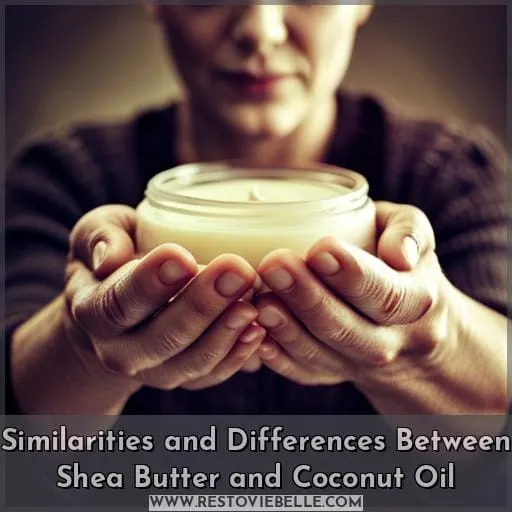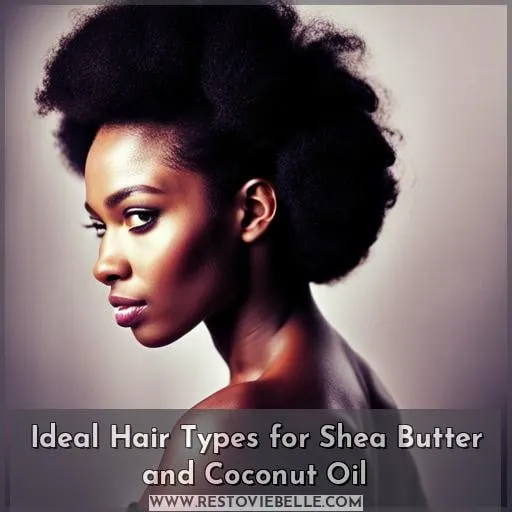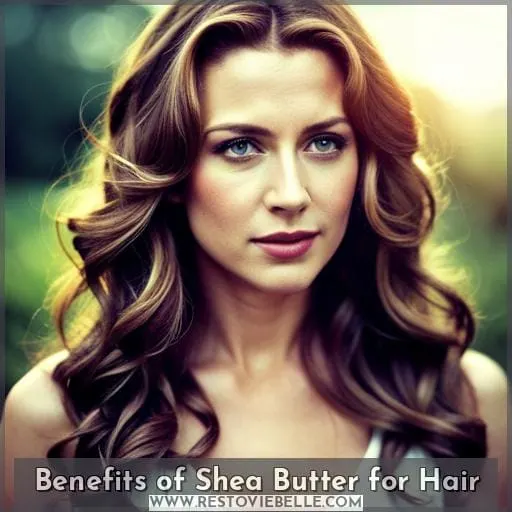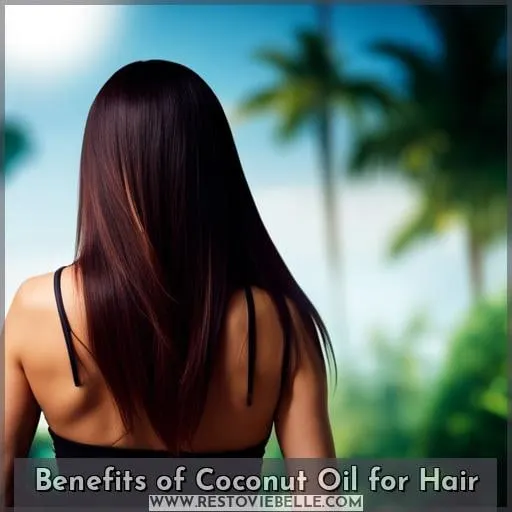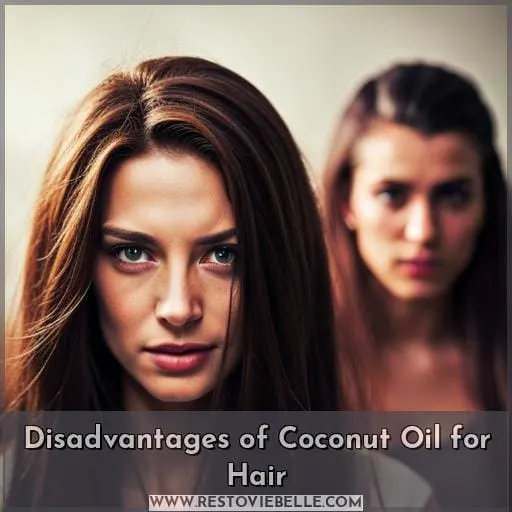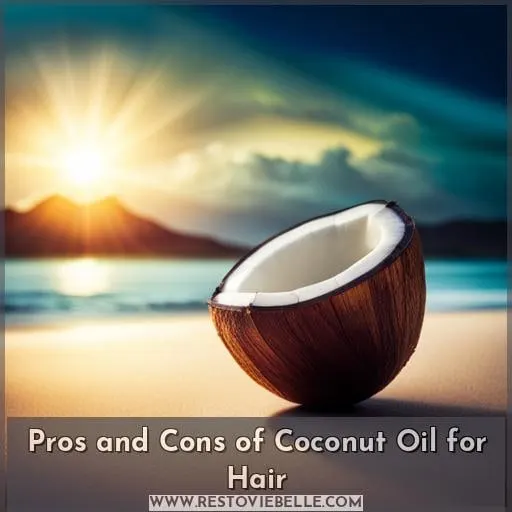This site is supported by our readers. We may earn a commission, at no cost to you, if you purchase through links.
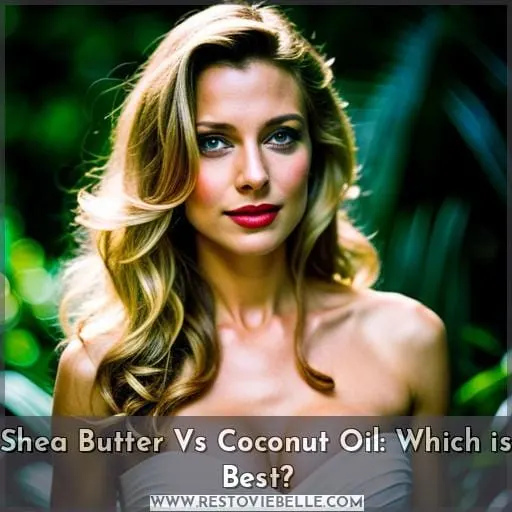 Are you wondering which is better for your hair – shea butter or coconut oil? With so much information out there, it can be hard to know what’s right. Both products offer great moisturizing properties that make the hair look and feel healthier, but their differences in texture and smell mean they may be more beneficial to different types of hair.
Are you wondering which is better for your hair – shea butter or coconut oil? With so much information out there, it can be hard to know what’s right. Both products offer great moisturizing properties that make the hair look and feel healthier, but their differences in texture and smell mean they may be more beneficial to different types of hair.
In this article, we’ll discuss the similarities and differences between shea butter and coconut oil when used on the hair, as well as answer some frequently asked questions about them both.
Table Of Contents
- Key Takeaways
- Similarities and Differences Between Shea Butter and Coconut Oil
- Ideal Hair Types for Shea Butter and Coconut Oil
- How to Choose the Best Shea Butter and Coconut Oil for Your Hair
- Benefits of Shea Butter for Hair
- Disadvantages of Shea Butter for Hair
- Benefits of Coconut Oil for Hair
- Disadvantages of Coconut Oil for Hair
- Shea Butter Vs Coconut Oil for Hair: Which is Best?
- Pros and Cons of Shea Butter for Hair
- Pros and Cons of Coconut Oil for Hair
- Conclusion
Key Takeaways
- Shea butter is ideal for thick or coarse hair, while coconut oil is suitable for fine to medium hair.
- Shea butter has a heavier texture and higher vitamin content, while coconut oil is lightweight and offers hydration and shine.
- Shea butter has a strong scent, while coconut oil has a subtle fragrance.
- Overuse of coconut oil can lead to dryness, and shea butter may prevent water penetration, so moderation is key for both.
Similarities and Differences Between Shea Butter and Coconut Oil
Shea butter and coconut oil are two popular ingredients used in hair care products to improve shine, reduce split ends, and nourish hair. Both contain vitamins and acids that make them ideal for different types of hair; however, there are also some differences between the two, such as consistency, scent, and weight.
By understanding these similarities and differences between shea butter and coconut oil for hair, you can better decide which one is best suited for your needs.
Benefits of Using Oils and Butter on Hair
You can reap the rewards of oils and butters in your haircare routine, with moisture-rich ingredients that improve shine and reduce split ends. Shea butter is known for its vitamins A & E as well as fatty acids, while coconut oil provides essential proteins to protect hair from damage.
Both are great moisturizers to keep hair hydrated without weighing it down or causing a greasy residue.
DIY treatments like masks or conditioners made with these natural products nourish scalp health and texture, so you can enjoy healthier locks between haircuts! With shea butter’s strong scent and coconut oil’s subtle fragrance, plus their lightweight qualities making them ideal for all types of strands, you’ll have everything you need to give your mane some extra love!
Similarities Between Shea Butter and Coconut Oil
Discover the natural power of two popular oils for your hair and learn how they compare! Shea butter and coconut oil are both known to have moisturizing properties, improve hair shine, and contain vitamins & acids, with shea having higher vitamin content.
They also differ in scent; shea has a strong aroma, whereas coconut is subtle. Both work great depending on your hair type: fine-medium looks best with coconut oil, while thick/coarse benefits from shea butter’s nourishing abilities.
Differences Between Shea Butter and Coconut Oil
See how these two popular products differ in texture, scent, and benefits for your hair.
Shea vs Coconut: Shea butter is heavier with a strong scent, while coconut oil has a subtle smell and lightweight feel. Its moisturizing properties make it ideal for fine to medium hair types (coconut) or thick, coarse ones (shea).
Usage tips vary – avoid applying too much coconut oil on dry or coarse strands as it can damage them.
Haircare benefits are plentiful though – both nourish locks and promote healthier growth! When considering which one is right for you, consider their advantages and disadvantages before making the best choice possible!
Ideal Hair Types for Shea Butter and Coconut Oil
Depending on your hair type, one oil may be better suited than the other to give you nourished locks and a healthy shine. If you have fine or thinning hair, coconut oil is ideal as it won’t weigh down the strands and will provide hydration without making them look greasy.
Its lightweight consistency also makes it perfect for adding shine without weighing down delicate tresses.
For those with thick or coarse hair, shea butter has greater moisturizing effects that can help reduce frizz and add definition to curls while improving softness and reducing breakage. Both oils are great options when looking for natural products that offer excellent results in terms of enhancing overall texture, restoring moisture balance in strands, promoting more vibrant color due to their reflective properties, and providing antioxidant benefits from vitamins A & E found in Shea Butter.
Coconut oil works best if used sparingly; its anti-inflammatory properties make it an ideal choice for scalp treatments too! On the other hand, shea butter is heavier than coconut oil but penetrates deep into the cuticles, giving protection against environmental elements like UV rays which can damage fragile follicles over time, leading to split ends and dryness.
Both oils offer gentle yet effective ways of controlling unruly manes while restoring lost luster, so they appear softer and shinier with each use – all without compromising healthiness at any level, regardless of whichever type suits individual needs best! No matter what combination is chosen between these two powerful ingredients, each comes with its own advantages towards achieving dreamy hairstyles that last longer while maintaining a healthy head full of gorgeous locks!
How to Choose the Best Shea Butter and Coconut Oil for Your Hair
When it comes to choosing the best shea butter and coconut oil for your hair, there are many factors to consider. From organic, unrefined, raw shea butter to Maui Moisture Shea Butter Hair Mask and Garnier Ultimate Blends Hair Food Banana, understanding the benefits of each product can help you determine which one is right for you.
Hair type considerations
Considering your hair type is key when deciding between shea butter and coconut oil for your haircare routine. Fine hair may require lighter products like coconut oil, while coarse or dry locks benefit from heavier shea butter.
Be mindful of moisture levels; too much can leave the scalp greasy and weighed down, whereas not enough will result in frizzy strands.
Additionally, understanding the porosity of your hair texture will help determine which product works best for you. Higher-porosity types need more hydrating ingredients to absorb easily into each strand.
Moisturizing properties comparison
Comparing their moisturizing properties, shea butter and coconut oil offer different benefits for various types of hair. Shea butter is highly moisturizing and able to penetrate the scalp better than coconut oil due to its heavier texture.
Coconut oil has a lighter consistency, which makes it ideal for finer hair but can cause dryness in coarser textures.
The application methods also affect moisture retention. Depending on your porosity level, you may need more or less product.
Product recommendations should always be tailored to individual needs, with high-quality all-natural ingredients being the priority choice over synthetic options such as silicones or fragrances that can damage the hair over time if used too frequently.
Professional opinions and advice
Professional natural hairstylist Aeleise Jana advises against using shea butter and coconut oil, citing seven reasons why they can lead to dryness and frizz:
- Heavy oils create a barrier between hair and water.
- Overuse of coconut oil leads to product buildup.
- Not suitable for co-washing or low porosity hair.
- Unappealing scent and color from shea butter.
- Coconut oil is not ideal for coarse or dry hair types.
- It can prevent moisture balance in some cases.
- May result in dry, brittle, or greasy locks.
Expert advice suggests understanding the potential drawbacks of these products before use as part of an overall haircare routine that promotes healthy, strong tresses!
Benefits of Shea Butter for Hair
When it comes to hair care, Shea Butter and Coconut Oil offer different advantages. Both contain vitamins and acids, with Shea Butter boasting more vitamin content. While Coconut Oil is lightweight and ideal for fine to medium hair, Shea Butter has a heavier texture that works better on thick or coarse hair types.
However, professional hairstylists advise against using these oils in excess as it can lead to dryness or product buildup over time.
Shea butter’s vitamin content
You can reap the rewards of shea butter’s vitamin content, such as A and E, in just one application that’ll have you feeling like a million bucks.
This nutrient-rich haircare product is an ideal choice for strengthening hair while restoring texture and shine. Compared to coconut oil, Shea Butter has higher levels of vitamins and fatty acids; perfect for providing intense moisturization without weighing down your locks.
Whether using it as a homemade cream or store-bought solution, make sure it’s a single ingredient with all-natural properties!
With its mighty nutrients packed into every use, Shea Butter will leave you with healthy-looking hair that radiates confidence from within.
Coconut oil’s lightweight benefits
Coconut oil’s lightweight properties make it the ideal choice for fine to medium hair. It provides a natural shine and nutrients without weighing down your locks. Coconut oil is highly moisturizing and helps hydrate dry hair while simultaneously restoring its texture.
Its ability to penetrate the scalp ensures that your strands are getting essential vitamins from homemade products like coconut oils, making them healthier overall.
Not only does this oil provide deep conditioning benefits, but it can also be used as a styling product. It offers an all-in-one solution compared to heavier oils such as shea butter, which may not always work well on finer textures.
Professional advice against usage
Aeleise Jana, a professional natural hairstylist, warns against using these oils due to their potential drawbacks. Hair care professionals debate the balance of moisture and sealants when using coconut oil and shea butter.
Overuse can lead to product buildup on fine or coarse hair, resulting in dryness; not removing an oil layer prevents water penetration. Alternatives such as co-washing with sulfate-free shampoos are recommended for achieving desired effects without compromising hair growth or healthiness.
Disadvantages of Shea Butter for Hair
When considering the disadvantages of shea butter for hair, it is important to note that this product can prevent water penetration in the hair. Additionally, co-washing with shea butter is not recommended due to its strong smell.
Knowing these potential downsides should help inform your decision when choosing a hair care product.
Shea Butter Can Prevent Water Penetration in the Hair
Have you ever wondered if using shea butter could prevent water from penetrating your hair? If so, it’s important to understand that this is not ideal for every type of hair. While it can be beneficial for high porosity hair due to its moisturizing properties, it may also create a barrier between the strands and moisture.
This means that while shea butter seals in hydration, it may hinder proper water penetration and balance required by low porosity or normal/medium porosity types of tresses.
Shea Butter is Not Suitable for Co-washing
Co-washing your hair with shea butter is not recommended as it can create a barrier between the moisture and the strands, reducing its effectiveness in cleansing and retaining moisture in low porosity hair.
Alternatives like coconut oil are more ideal for co-washing since they provide better hydration without leaving residue behind on the hair shafts. Proper application of oils will also help ensure that your scalp won’t be left feeling greasy or heavy after washing.
Shea Butter Has a Strong Smell
You may find that shea butter has a strong smell, which can be off-putting for some people; in fact, up to 80% of users have complained about its scent. To combat this issue, consider your personal preferences when selecting fragrances and store-bought products.
Use less product when applying hair masks or conditioners with shea butter as an ingredient. Try alternatives such as coconut oil or other natural oils for nourishing the scalp and strands.
Benefits of Coconut Oil for Hair
You may already be familiar with the moisturizing properties of coconut oil, but did you know it also has many benefits for your hair? Coconut oil can help improve hair shine and is an excellent protein treatment.
Moisturizing properties of coconut oil
Slather your locks in a luxurious blend of tropical moisture to give them the nourishment they deserve. Coconut oil is an excellent choice for hydrating and moisturizing hair, whether you have fine or thick tresses.
This natural oil offers numerous benefits. It provides shine and protection from heat styling tools like straighteners and curling irons. It also helps maintain hair color, improves detangling ability, and increases elasticity.
To incorporate coconut oil into your haircare routine, you can use it as a pre-shampoo treatment mask. Alternatively, you can add small amounts after showering to retain more water in the cuticle layer of strands.
Benefits of coconut oil for hair shine
Brushing your hair with a product made from coconut oil will leave it looking radiant and healthy.
- Haircare tips to hydrate and nourish hair strands;
- Natural ingredients that promote shine;
- DIY treatments for added softness and luster;
- Coconut oil helps seal in moisture. No matter your hairstyle, you can use coconut oil as an alternative to costly products and still get excellent results. A few drops of the oil is all you need for your locks to be restored back to their beautiful glory!
Coconut oil as a protein treatment
Discover how using coconut oil as a protein treatment can help strengthen, nourish, and protect your hair. Coconut oil is packed with vitamins, minerals, and fatty acids, all of which work together to repair damaged strands while providing intense hydration.
When used regularly in conjunction with other treatments, such as deep conditioning masks or hot oils, the moisturizing effects of coconut oil will give you stronger, healthier-looking locks that are less prone to breakage and split ends.
Disadvantages of Coconut Oil for Hair
When it comes to hair care, many people are drawn to the benefits of coconut oil. However, there are some disadvantages that can come with using this product, which include dryness and heaviness for certain hair types.
Therefore, it is important to understand both the pros and cons before incorporating coconut oil into your hair care routine.
Coconut Oil Can Lead to Dry Hair
If you overuse coconut oil, it can lead to dryness and frizz, so be sure to use it sparingly. To prevent this from happening, consider moisturizing alternatives such as shea butter or other natural oils.
A good haircare technique is hair oiling – an ancient practice that involves applying the right amount of oil evenly throughout your strands for a healthy shine. When selecting products for your routine, avoid anything with sulfates or silicones as these are known to strip away moisture even further.
Lastly, pay attention when choosing which ingredients will work best for you based on personal preference and texture type; there are plenty of natural solutions out there!
Coconut Oil Can Be Too Heavy for Some Hair Types
You may find coconut oil too heavy for your hair type. Consider the following when deciding whether to use it:
- Hair type considerations – if you have fine or low porosity hair, coconut oil could make your locks more brittle and dry.
- Moisture balance – using too much of this product can lead to greasy dullness due to product buildup.
- Alternative hair oils – if you’re not sure about using shea butter or coconut oil, there are other natural options like jojoba and avocado that offer similar benefits without leaving residue on your strands.
Managing product buildup is essential for healthy-looking tresses. Look into ways of removing excess oils with a moisturizing shampoo or co-wash method while still providing enough moisture to avoid dryness and frizziness from overuse of these products.
Shea Butter Vs Coconut Oil for Hair: Which is Best?
Comparing these two natural ingredients, you’ll find a range of benefits and drawbacks that affect your hair health.
| Shea vs Coconut | Moisturizing Effects | Hair Texture |
|---|---|---|
| Shea Butter | Highly moisturizing | Thick, coarse |
| Coconut Oil | Lightweight | Fine to medium |
Scent Preferences
Strong scent
Subtle smell
Hair Mask Options
Organic Unrefined Raw
Maui Moisture Shea Butter
Garnier Ultimate Blends Banana
Shea butter is packed with vitamins A and E, as well as fatty acids, for nourishing and thickening hair. Coconut oil, on the other hand, contains proteins that strengthen the strands. Shea butter is ideal for those with thicker locks, but its strong odor may be off-putting to some.
Meanwhile, coconut oil works better on finer tresses due to its lightweight nature.
Both oils are versatile enough to be used alone or combined together into custom treatments, depending on the desired outcome.
As beneficial as these products may seem, their use comes at a cost. When applied too liberally, they create an impermeable barrier over each strand, making it difficult for moisture from water to penetrate deep into the follicles.
This can result in dryness and frizziness instead of maintaining healthy locks over time.
Ultimately, which one best suits you depends on personal preference, but always remember that moderation is key!
Pros and Cons of Shea Butter for Hair
Discover the advantages and drawbacks of using Shea Butter for hair care, from its nourishing properties to potential overuse issues.
Shea Butter is a popular haircare product that contains vitamins and acids to improve shine, reduce split ends, promote thicker hair growth, and provide moisture. Its texture is heavier than coconut oil, which makes it ideal for thick or coarse hair types.
Shea Butter has high levels of Vitamin A & E as well as fatty acids to further nourish your locks. However, if used excessively, it can lead to greasy, dull-looking strands due to product buildup. This makes it important not to use too much on fine or dry hair types. Instead, opt for lighter oils like Coconut Oil, which are better suited in this case.
In addition, be aware that some people may find its strong odor unappealing. So, take caution when selecting products with shea butter ingredients in them, such as homemade creams or shampoos.
Overall, understanding how different hair types react differently to these powerful oils will help you make informed decisions when deciding what works best for you!
Pros and Cons of Coconut Oil for Hair
Coconut oil is a popular choice for hair care due to its pleasant smell, lightweight feel, and high fatty acid content. However, like all oils, it has drawbacks that should be considered when selecting the right product for your hair type.
Coarse or dry hair will find coconut oil too heavy and can actually make it more brittle as opposed to softer.
Additionally, low porosity hair may not benefit from this type of treatment; instead, look into lighter moisturizers such as aloe vera gel or glycerin spray which are better suited for absorbing moisture into the scalp without weighing down strands.
If experimenting with different types of oils on your tresses, remember balance is key: create a level playing field between external hydration (oils) and internal hydration (water).
Finally, take note that some ingredients require special application methods – such as co-washing with shea butter – so make sure you do your research before applying any products onto dampened or wetted tresses!
Try out different combinations until you find what works best, then continue regularly investing in an effective haircare system tailored specifically to meet the needs of YOUR mane’s unique texture & density levels – because only YOU know how far will go when caring for those precious curls & coils!
Conclusion
To sum it up, Shea Butter and Coconut Oil both offer unique benefits for hair care. Shea Butter is a heavier product and is great for thick, coarse hair, while Coconut Oil is lightweight and ideal for fine to medium hair.
Both products contain vitamins and nourish the hair, but Shea Butter has a stronger scent while Coconut Oil has a subtler scent.
Though they are both popular haircare products, they are not universally better for all hair types, so it’s important to understand the potential drawbacks of each before using them.
